The issues were a common thread of speakers at the opening of the 52nd Annual General Meeting of the RNB on Tuesday, 12 August in Barbados, where the spotlight was placed on the anticipated increase in the need for nurses and midwives, and the need for guidance and action to mitigate the impacts of the shortage.
Dr. The Most Honourable Jerome Walcott, Minister of Health and Wellness of Barbados, delivered the feature address in which he lauded the achievements of the Regional Nursing Body over the past 50 years and its unwavering commitment to nursing excellence.
“The RNB now stands at a critical crossroad. You are not only being called upon to sustain the gains of the past, but to lead the transformation of the profession, to shape new models of care, and to prepare our nursing workforce to face complex health challenges ahead, which include, of course, ‘Dr. Google’ and the worrisome effects of climate change,” the Minister said.
He pointed to the “troubling trends” and “growing concerns” about nurse retention and called for courage and collaboration in charting the course ahead.
“Too many of our nurses are leaving for greener pastures, an issue that has become more acute in recent years. Small developing states such as ours simply cannot match the salaries and benefit packages offered by the larger, wealthier nations. As a result, we are facing staffing shortages that increase nurse-to-patient ratios, create longer shifts, which can lead to stress and burnout in some cases, and ultimately can compromise the quality of patient care,” he noted.
In her remarks, Ms. Alison Drayton, Assistant Secretary-General, Human and Social Development at the CARICOM Secretariat, highlighted the “critical shortage of these indispensable health professionals.” She cited the State of the World’s Nursing Report 2025 (SOWN), which pointed out that one in seven nurses globally was practising outside of the country of their birth, underscoring a growing dependence on foreign-born nurses within high-income countries.
“This dynamic poses significant challenges to the development and sustainability of health systems in low- and middle-income countries like those within our Region. Accordingly, it is imperative that the Region substantially increase its investments in the education, recruitment, and retention of nurses and midwives to safeguard the resilience and effectiveness of our health workforce,” the Assistant Secretary-General said.
Ms. Nester Edwards, Chair of the Regional Nursing Body and Chief Nursing Officer of the Ministry of Health, Wellness and Religious Affairs of Grenada, also warned of the consequences if gaps are not filled.
“While they are among the largest, if not the largest, segment of the workforce in our healthcare systems, the Region continues to face a perennial shortage of nurses and midwives with high attrition rates and migration to more developed countries. According to the SOWN 2025 report, we are unlikely to achieve the targets for universal health coverage if the gap in these shortages is not filled,” she said.
She called for redoubled efforts to find effective strategies to recruit and retain nurses and midwives, including those in the diaspora. “Improving working conditions and utilising technological advancements and incentives, including flexible working hours, should be considered when developing these strategies,” she said.
The RNB chair also urged capacity-building of the next generation of nurses and midwives in leadership, policy development, strategic planning, and research.
Agenda items for the three-day meeting include developing an action plan to address the migration and mobility of health workers in the Region, a review of the SOWN 2025, new developments in nursing, and the results of the April 2025 sitting of the Regional Examination for Nurse Registration.
]]>“The CARICOM Secretariat sees [the CARPHA Strategic Plan 2025–2030] as an opportunity to strengthen structured collaboration between the Secretariat, CARPHA and other regional entities, and a road map to guide how Member States align their priorities and collaborate on critical regional imperatives. Ladies and gentlemen, this will no doubt require coordinated approaches to resource mobilisation, clear implementation roles across the health landscape and joint reporting on progress on regional development outcomes. We must reduce duplication, increase interoperability and focus on results that matter to the people of this Community.”
Dr Armstrong Alexis
Deputy Secretary-General, CARICOM
The Caribbean Public Health Agency (CARPHA) officially unveiled its Strategic Plan 2025–2030 today, Wednesday, 30 July, at the Pegasus Hotel Guyana, marking a pivotal moment for regional public health advancement.
The high-level event featured a keynote address by Dr Armstrong Alexis, Deputy Secretary-General of the Caribbean Community (CARICOM), who later joined CARPHA Executive Director Dr Lisa Indar to unveil the new Strategic Plan.
In his remarks, Dr Alexis emphasised the critical importance of strategic clarity and regional alignment in the face of shifting global dynamics.
“This Plan arrives at a time when focused implementation and deliberate design are essential. The Caribbean is now navigating a global landscape defined by overlapping crises, economic uncertainty, climate volatility, increased disease threats, and persistent structural challenges,” he stated. “These complexities demand evolving institutional responses, and CARPHA’s forward-looking strategy demonstrates a timely and commendable commitment to action.”
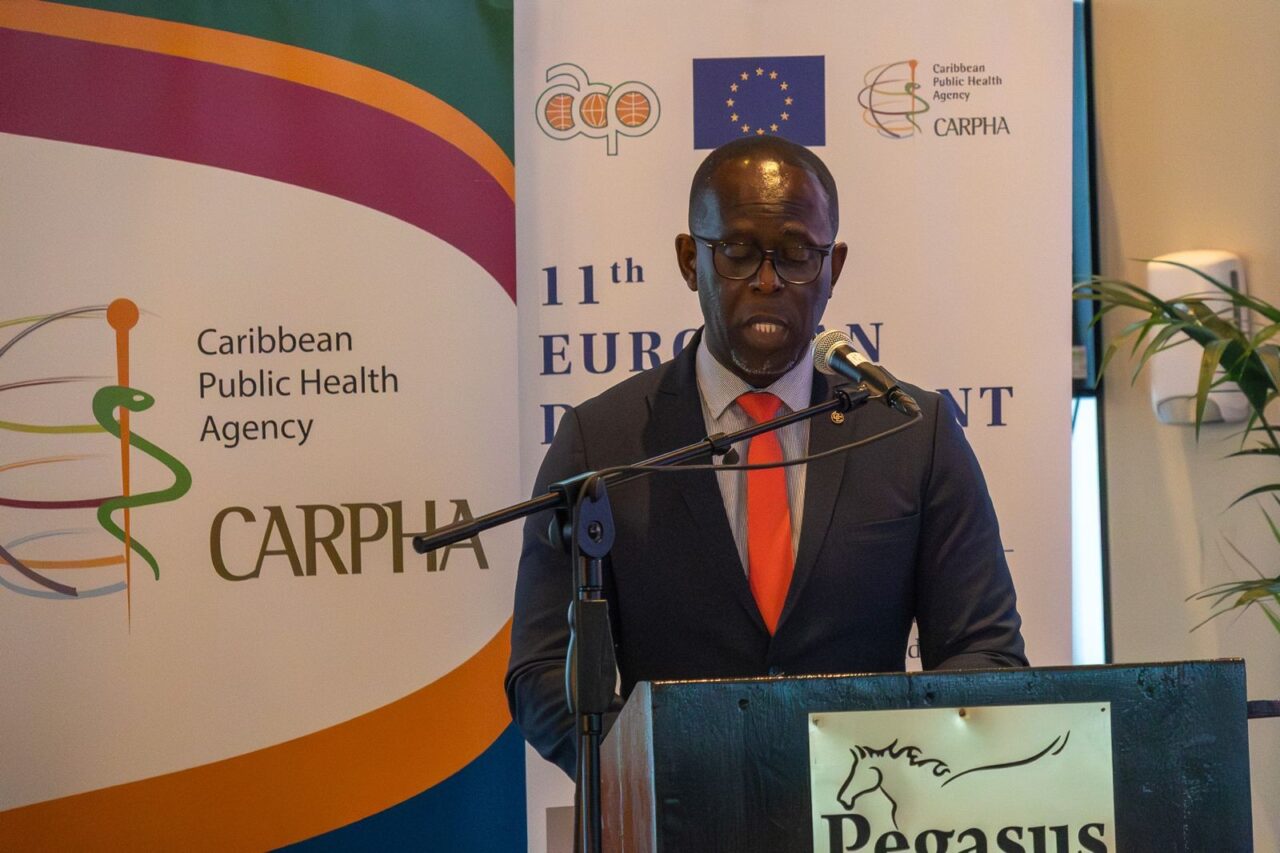
Dr Alexis further noted the potential for deeper integration across the Region, highlighting the Plan as a mechanism to enhance structured collaboration among CARPHA, the CARICOM Secretariat, and other regional institutions. He stressed the need for coordinated resource mobilisation, clearly defined implementation roles, and joint reporting mechanisms to monitor regional development outcomes.
“We must reduce duplication, increase interoperability, and focus on results that matter to the People of this Community,” concluded Dr Alexis.
CARPHA’s Strategic Plan 2025–2030 sets out the agency’s vision for strengthening regional health systems, fostering innovation, and delivering measurable impact across the Caribbean. The launch underscores a renewed commitment to public health leadership and resilience at a time when regional cooperation has never been more vital.
Please view Dr Alexis’ complete remarks below.
Keynote Address
by
Dr Armstrong Alexis
Deputy Secretary-General, CARICOM
Launch of the CARPHA Strategic Plan 2025–2030
30-31 July 2025
“Strategic Leadership in Regional Health”
Salutations:
- I wish to particularly say a pleasant good morning to the Chair of the CARPHA Board, the Hon. Minister Philip Telesford, Minister of Health of Grenada and Chair of the Board.
- Ms. Alison Drayton, Assistant Secretary-General, Human and Social Development
- Dr Lisa Indar, Executive Director, CARPHA
- Chief Medical Officers
- Permanent Secretaries
- Colleagues from the CARICOM Secretariat and CARPHA
- Representatives of Regional Institutions
- International Development Partners
- Ladies and Gentlemen
Good morning!
It is an honour and my distinct pleasure to be addressing you as your Keynote Speaker at this significant launch of the CARPHA 2025 – 2030 Strategic Plan. This, for me, is very significant as it comes in the backdrop of recent changes in the global economic landscape that necessitate a paradigm shift in the setting of priorities and ensuring that our institutions better position themselves to address the growing needs of our Region and its people.
I am particularly pleased to be addressing you this morning because over the past ten months, I have engaged CARPHA and officials in public health in the Caribbean in a number of settings, ensuring through it all, that the importance of the role that CARPHA plays as CARICOM’s premier public health institution is both recognised and secured. Today’s launch comes only a week after the Secretary-General of the Caribbean Community signed a Joint Sub-regional cooperation Strategy with PAHO. CARPHA was intimately involved in crafting this strategy and will be integral in its implementation. The timeliness and relevance of this launch are therefore underscored as a pivotal and strategic landmark that signals the continuation of thoughtful and deliberate interventions to benefit the Region and secure public health gains that, if not reinforced, run the risk of loss of or reversal in previously achieved results.
My presence here this morning is also an indication of the commitment of the CARICOM Secretariat to walk the journey of hope and optimism with you, to navigate the tides of uncertainty with you and a pledge of the Secretariat’s commitment accompany you, advocate for you and join you in designing a future that affords our citizens a public health architecture that meets their needs, protects their interests and secures their right to live in a healthy Caribbean Region.
Ladies and gentlemen, we gather at a time when strategic clarity, alignment and implementation are not optional; on the contrary, they are essential ingredients for success and as I alluded earlier, the current shifts in the multilateral system compels us to be more strategic in our planning, more deliberate in our design and more focused in our approaches to secure results for our people. The global context in which the Caribbean must now operate is marked by overlapping crises, economic uncertainty, climate volatility, increased disease threats and persistent structural changes and challenges. These are complex issues, but they are not new to us, and while they evolve, so must our institutional responses. It is therefore timely and commendable that CARPHA has laid out a plan that is both responsive and forward-looking.
Importantly, the CARPHA Strategic Plan 2025-2030 does not exist in isolation. It complements and supports the broader health goals of the CARICOM Secretariat Strategic Plan 2022–2030.
There are several areas where this alignment is evident. Both Plans emphasise the urgent need to build resilient health systems capable of responding to public health threats. The Secretariat’s work through the Caribbean Cooperation in Health Framework and the Caribbean Regional Strategic Framework for HIV and AIDS is strengthened by CARPHA’s technical expertise in this area. The fight against NCDs remains central to the regional health agenda. CARPHA continues to provide technical leadership to the several policy mandates of the Community and in keeping with the Heads of Government adoption of a Results-Based Management Framework for the Caribbean and the Community, your Board has directed CARPHA to anchor its operations on the principles of Results-Based Management, and that is commendable.
It is my view, based on the value of the support you provide to the Community, the dedication of your team and the indispensable nature of your work, that CARPHA is a high-performing organisation. I am aware that there are challenges, but despite the bumps along the way, you have been able to withstand those forces that threaten to derail you and have persevered. Your achievement for the ending period is irrefutable, and your pathway to 2030 is well articulated in this plan that is being launched this morning. I can only therefore wish you every success and remind you that the CARICOM Secretariat is here to support you as you undertake your role as the Community’s premier public health institution.
It is also commendable that the leadership of CARPHA has so strategically positioned the organisation to ensure that the gains of the previous period will continue into the next. I want to pay particular congratulations to Dr Indar. I am not sure, Dr Indar, if I should still refer to you as the new Executive Director, but in your role, I wish to commend you for the tremendous work that you have done and the partnership that you have built over the past few months.
CARPHA and the CARICOM Secretariat have collaborated on several fronts in providing support to Member States, particularly in scaling up prevention efforts, strengthening surveillance and improving access to care. A thorough review of the CARICOM 2030 Strategic Plan and CARPHA’s Plans acknowledges the growing need for integrated mental health and psychosocial support. This is especially relevant in post-disaster and post-pandemic contexts, and evidence from post-Beryl, post-COVID-19 and post-volcanic eruption indicates clearly that trauma and recovery intersect with development. Finally, even as the Secretariat advances its work on climate resilience, it is imperative that CARPHA’s health-environment nexus be supported, whether through vector control, food and water safety, or health emergency preparedness.
The CARICOM Secretariat sees this Strategic Plan as an opportunity to strengthen structured collaboration between the Secretariat, CARPHA and other regional entities, and a road map to guide how Member States align their priorities and collaborate on critical regional imperatives. Ladies and gentlemen, this will no doubt require coordinated approaches to resource mobilisation, clear implementation roles across the health landscape and joint reporting on progress on regional development outcomes. We must reduce duplication, increase interoperability and focus on results that matter to the people of this Community.
Distinguished Ladies and Gentlemen, strategic plans are only as good as the results obtained from their implementation. The CARICOM Secretariat welcomes the strong alignment between our two Plans, but alignment is just the beginning. What we now need is to deliberate on coordination between regional institutions, particularly in terms of implementation in Member States, resource mobilisation and progress monitoring. A key component of the successful implementation of this Strategic Plan will be robust monitoring and evaluation, allowing us to track progress, assess impact and make timely adjustments. Capacity building within Member States must also remain a priority. By investing in the training and development of healthcare professionals, we strengthen the foundation of our regional health systems. In parallel, we must continue to advocate for evidence-based health policies and facilitate the sharing of best practices across our Member States. These actions, taken together, will not only enhance delivery but will also reinforce our collective commitment to improving public health outcomes, strengthening resilience and promoting long-term sustainability in the Caribbean.
I take this occasion to commend CARPHA on its achievements over the past five (5) years. One which stands out to me is being successful in the bidding for The Pandemic Fund and also, most recently, securing grants for the support of AMR-led projects of which Member States are beneficiaries. Ladies and gentlemen, these were not only timely, but invaluable. Let us applaud these tremendous achievements and recommit ourselves to doing even more to ensure purposeful benefits are derived from the outstanding work that is done every day by our public health professionals.
The CARICOM Secretariat remains committed to supporting CARPHA and urges Member States to continue dialogue on advancing health. Distinguished ladies and gentlemen, if there were ever a time for this collaboration, it’s now. Henry Ford reminds us that “Coming together is a beginning, keeping together is progress, working together is success“. We must continue to convene, coordinate, and advocate at the national, regional and international levels to ensure that health remains a pillar of resilience and a driver of development. As we move forward, let us be specific about where collaboration can be deepened for real impact on the Region’s human development and sustainability.
There are already mechanisms in place, such as the Caribbean Cooperation in Health Framework, Inter-agency and Member State-led Technical Working Groups, the Regional Health Communication Network, Regional Core Coordination Groups and other activities led by other partners. Let us build on these and ensure that implementation is not fragmented, but integrated and efficient.
In closing, I applaud CARPHA once again on the development of this strategic document which highlights a review of the achievements, challenges and the recommendations to not only mitigate current threats, but to be strategically positioned to address future and re-emerging health threats. Ladies and gentlemen, this is a significant milestone that is to be celebrated. The CARICOM Secretariat reaffirms its support as we transition from planning to implementation. In closing, I wish you a successful launch, purposeful deliberations and succinct outputs from today’s engagement. I look forward to implementation on priority areas and in time to come, we should be able to gather again to review outcomes and celebrate success.
Thank you.
###
]]>The Caribbean’s unique vulnerabilities — from small population bases and porous borders to economic dependence on tourism and the escalating impacts of climate change — demand coordinated, context-specific, and forward-looking solutions. Strengthening our collective capacity to prevent, detect, and respond to health threats is, therefore, not optional, it is imperative.
Alison Drayton | Assistant Secretary-General | Human and Social Development | CARICOM
Regional and international public health stakeholders gathered in Georgetown, Guyana, for the Joint Workshop on Regional Health Security and the Regional Coordinating Mechanism for Health Security, held at the Pegasus Hotel Guyana, on Monday, 28 July. The event marked a pivotal moment in advancing the Regional Health Security Pathway, with discussions focused on assessing progress, identifying remaining gaps, and accelerating efforts to embed the public health tools developed by the Caribbean Public Health Agency (CARPHA) within national development frameworks.
Hosted by CARPHA, the workshop was convened under the theme “Transitioning from Pathway to Action.” It emphasised the importance of strategic coordination across countries and institutions and is aligned with opportunities presented by The Pandemic Fund, positioning the Caribbean to strengthen health systems through unified planning and implementation.
In her opening remarks, CARICOM’s Assistant Secretary-General for Human and Social Development, Alison Drayton, highlighted the Region’s shared experience with recent public health challenges, calling for a shift from vision to tangible results. “This is not only about public health—it is about safeguarding regional development, building resilience, and ensuring sustainability,” she noted.
The workshop provided a platform for dynamic dialogue among partners, reinforcing the collective commitment to a healthier, more secure Caribbean.
Please read the Assistant Secretary-General’s complete remarks below.
WELCOME REMARKS
Alison Drayton
Assistant Secretary-General, Human and Social Development
CARICOM Secretariat
Joint RHS and RCM-HS Workshop | “Transitioning from Pathway to Action”
Pegasus Hotel, Georgetown, Guyana
July 28, 2025 | 9:00 AM
Salutations:
The Honourable Dr. Frank Anthony – Minister of Health, Co-operative Republic of Guyana
Dr. Lisa Indar – Executive Director, CARPHA
Dr. Priya Basu – Executive Head, Pandemic Fund Secretariat
Dr. Kavita Singh – Sector Lead Specialist, Inter-American Development Bank
Esteemed representatives of PAHO/WHO, CDEMA, IMPACS, RSS, UKHSA, and other valued regional and international health partners
Representatives of CARICOM Member States and Associate Members
Development and Technical Partners
Members of the Media
Colleagues, Friends –
Good morning!
On behalf of the CARICOM Secretariat, it is my pleasure to extend a warm welcome to this Joint Workshop on Regional Health Security and the Regional Coordinating Mechanism for Health Security, held under the timely and action-oriented theme, “Transitioning from Pathway to Action.”
We meet today at a critical juncture. Our Region’s shared experience with recent public health threats has underscored the urgent need to transform intention into implementation, strategy into structure, and vision into verifiable results. It is not merely a matter of public health,it is a matter of regional development, resilience, and sustainability.
The Caribbean’s unique vulnerabilities — from small population bases and porous borders to economic dependence on tourism and the escalating impacts of climate change — demand coordinated, context-specific, and forward-looking solutions. Strengthening our collective capacity to prevent, detect, and respond to health threats is, therefore, not optional, it is imperative.
Following the 2014 Ebola threat, our Heads of Government responded with decisive leadership, establishing the Regional Coordination Mechanism on Ebola, which was later expanded in 2015 into the Regional Coordinating Mechanism for Health Security (RCM-HS). This mechanism, chaired by CARPHA, has become an essential pillar in our regional governance framework for health security.
Within this architecture, the Caribbean has led with innovation, developing homegrown tools and systems such as:
- Mass Gathering Surveillance Module,
- Tourism and Health Information System,
- Caribbean Vessel Surveillance System,
- Caribbean Public Health Laboratory Network,
- Caribbean Field Epidemiology and Laboratory Training Programme,
- and most recently, the implementation of projects under the Pandemic Fund.
These innovations represent more than just technical tools; they reflect a deliberate shift toward resilience, multisectoral coordination, and country ownership. We are moving from reactive response to strategic readiness, a vision we must all commit to making real.
We are deeply grateful to CARPHA, our Member States, and all international development partners for their tireless work and collaboration in advancing this agenda. We particularly recognise the critical support provided by the Pandemic Fund and the Inter-American Development Bank, whose investments are helping to future-proof our health systems and empower our Region to better withstand future crises.
Over the course of this workshop, I encourage frank and focused engagement. Let us assess our progress under the Regional Health Security Pathway, identify what remains to be done, and strengthen integration by embedding CARPHA’s public health tools within national health and development plans, all while aligning closely with the broader opportunities offered through the Pandemic Fund.
The CARICOM Secretariat remains steadfast in its commitment to advancing a Regional Health Security framework that is not only operational and effective, but inclusive and people-centred. Together, we must work to ensure that our health security efforts protect lives, preserve livelihoods, and secure the well-being and future of our Caribbean Community.
I thank you for your presence and participation and wish you a productive, solution-driven workshop.
Thank you
]]>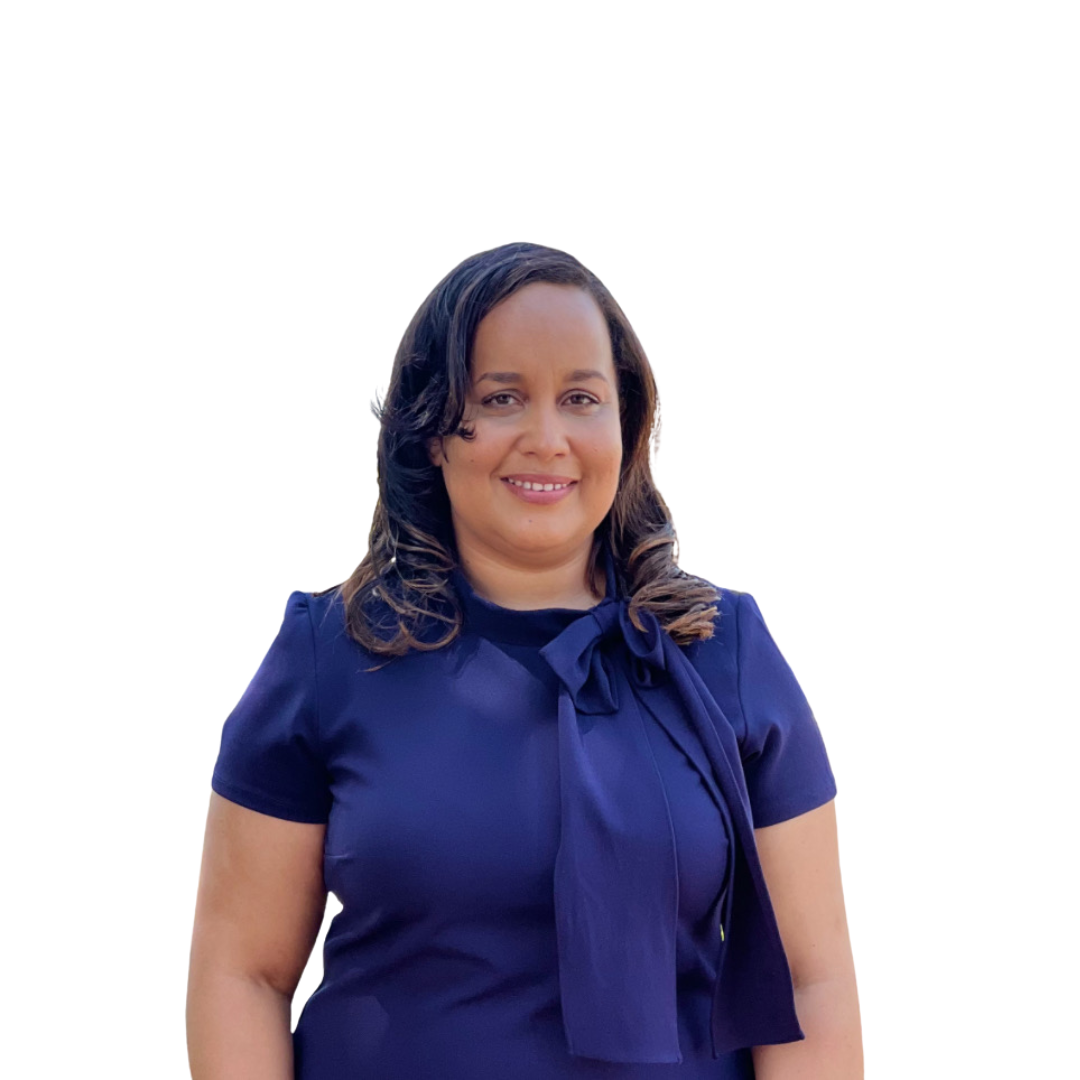
Programme Manager for Health Sector Development at the CARICOM Secretariat, Tamara Bobb, reminds us that hepatitis is a silent yet deadly disease impacting millions worldwide.
“Viral hepatitis remains a leading cause of liver cancer and related deaths worldwide, particularly due to chronic Hepatitis B and C infections. However, the truth is that it can be prevented through vaccination, treated with effective antivirals, and, in the case of Hepatitis C, often cured completely,” she said.
This year’s campaign highlights five key facts the public should know:
1⃣ Hepatitis is a silent threat—but we can stop it together. Globally, 3,500 lives are lost daily from B and C strains of hepatitis, which can cause severe liver damage and cancer. Most people are unaware that they are infected. Testing and awareness can save lives.
2⃣ A simple test can save your life. Even without symptoms, hepatitis can be present. Testing is quick and crucial for early treatment. If you’ve had surgery, tattoos, or were born before the 1990s, ask your doctor about screening.
3⃣ Vaccination starts protection early. Newborns can be exposed during birth. The Hepatitis B vaccine, especially when given within 24 hours of birth, offers lifelong protection. Parents and caregivers are encouraged to verify the vaccination status of their children.
4⃣ Stigma is still a barrier; let’s break it down. Misconceptions and blame prevent many from seeking care. Communities are encouraged to challenge myths and spread accurate, compassionate information.
5⃣ Everyone has a role to play. In the workplace, everyone can help to end hepatitis. Promote healthy workplace practices, join health screenings, and share information with friends and colleagues.
 For more information, please consult your health provider or visit the WHO’s official Hepatitis page: https://www.who.int/campaigns/world-hepatitis-day
For more information, please consult your health provider or visit the WHO’s official Hepatitis page: https://www.who.int/campaigns/world-hepatitis-day
]]>
“The [PAHO-CARICOM Joint Sub-regional Cooperation Strategy (JSCS) 2025-2029] is a continuation of a process. CARICOM has prioritised health outcomes for a long time, and this long-standing commitment of CARICOM will continue.”
Dr Carla Barnett | Secretary-General | CARICOMWednesday, 23 July 2025 (CARICOM Secretariat, Turkeyen, Greater Georgetown): The Caribbean Community (CARICOM) and the Pan American Health Organization (PAHO) on Tuesday, signed a Joint Subregional Cooperation Strategy (JSCS) aimed at enhancing regional public health response and resilience through coordinated technical collaboration. The agreement was formalised by CARICOM Secretary-General Dr Carla Barnettand PAHO Director Dr Jarbas Barbosa.
This joint strategy establishes a five-year plan for concerted action to address common regional health issues, uniting CARICOM, PAHO, subregional, and international partners to bolster the Caribbean’s health agenda. It focuses on five key strategic priorities to steer PAHO’s technical assistance in the Caribbean subregion. All fifteen (15) CARICOM Member States as well as six the (6) Associate Members will benefit from this strategy.
Dr Barnett, in her address, recogised PAHO’s continued collaboration, noting,
“The [PAHO-CARICOM Joint Sub-regional Cooperation Strategy (JSCS) 2025-2029] is a continuation of a process. CARICOM has prioritised health outcomes for a long time, and this long-standing commitment of CARICOM will continue.”
The Secretary General expressed that this landmark moment in the partnership with PAHO, solidifies the ongoing support for the development and implementation of public health policies across the Region and ensures good health investments for the People of the Community.
Dr Barnett shares more of her perspective on the JSCS below.
“This signing marks a milestone in a long-standing partnership rooted in trust, mutual respect, and a shared vision for the health and well-being of the peoples of the Caribbean,” said Dr Barbosa, emphasising that “the Caribbean faces unique and interconnected public health challenges: from the rising burden of noncommunicable diseases, to the effects of climate change, to the urgency of digital transformation and the need for resilient health systems. These challenges do not stop at borders, and neither can our solutions.”
The PAHO Director provides more insight on the organisation’s long-standing partnership with CARICOM below.
Guyana’s Minister of Health, Hon. Dr. Frank Anthony, echoed the significance of the Joint Strategy, stating,
“This strategy affirms that health is not just a service, it is a right. In the Caribbean, that right must not be determined by geography, income, or age.”
Minister Anthony shares more of his perspective on the JSCS below.
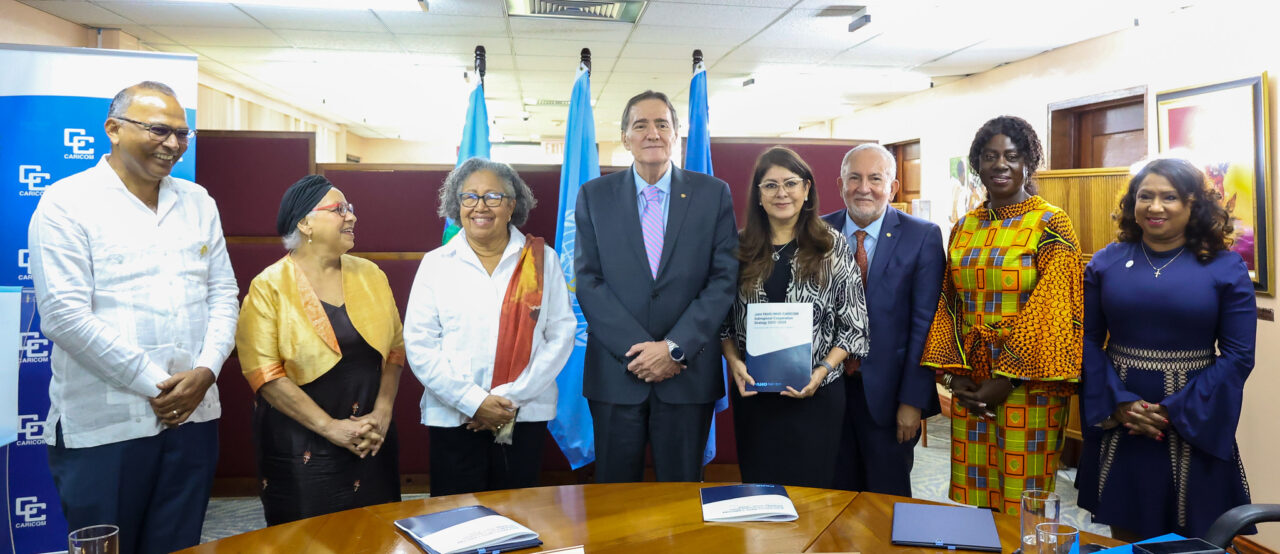
Helpful Links:
Noncommunicable Diseases | Data/Statistics
https://www.paho.org/en/topics/noncommunicable-diseases
Major Storm on the Horizon: NCDs and mental health conditions to cost South America trillions by 2050
]]>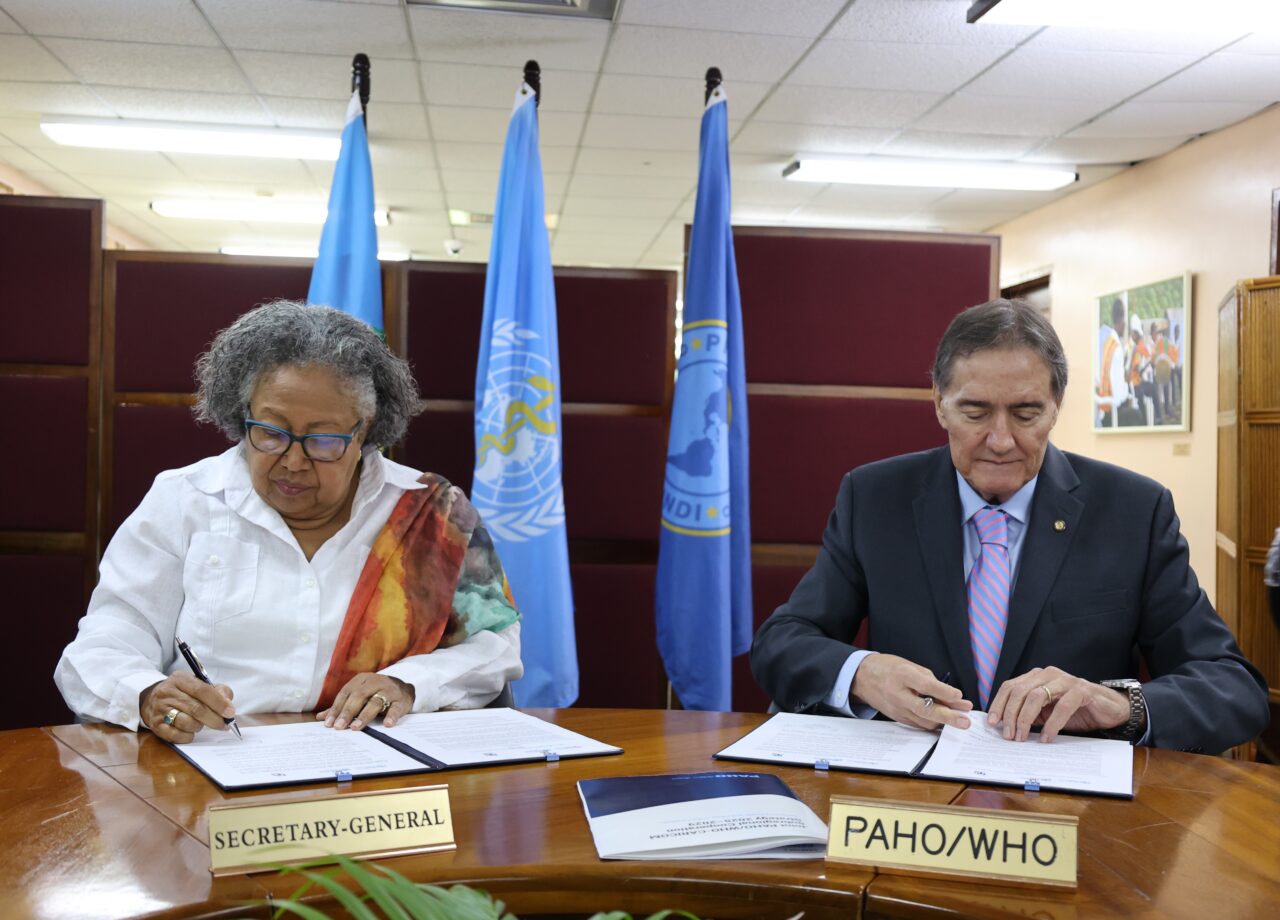
This powerful partnership sets the course for five years of unified action to tackle regional health challenges, bringing together CARICOM, PAHO, and partners near and far to strengthen the Caribbean’s health agenda.
The JSCS will also address the Region’s common health challenges in a coordinated and integrated manner.
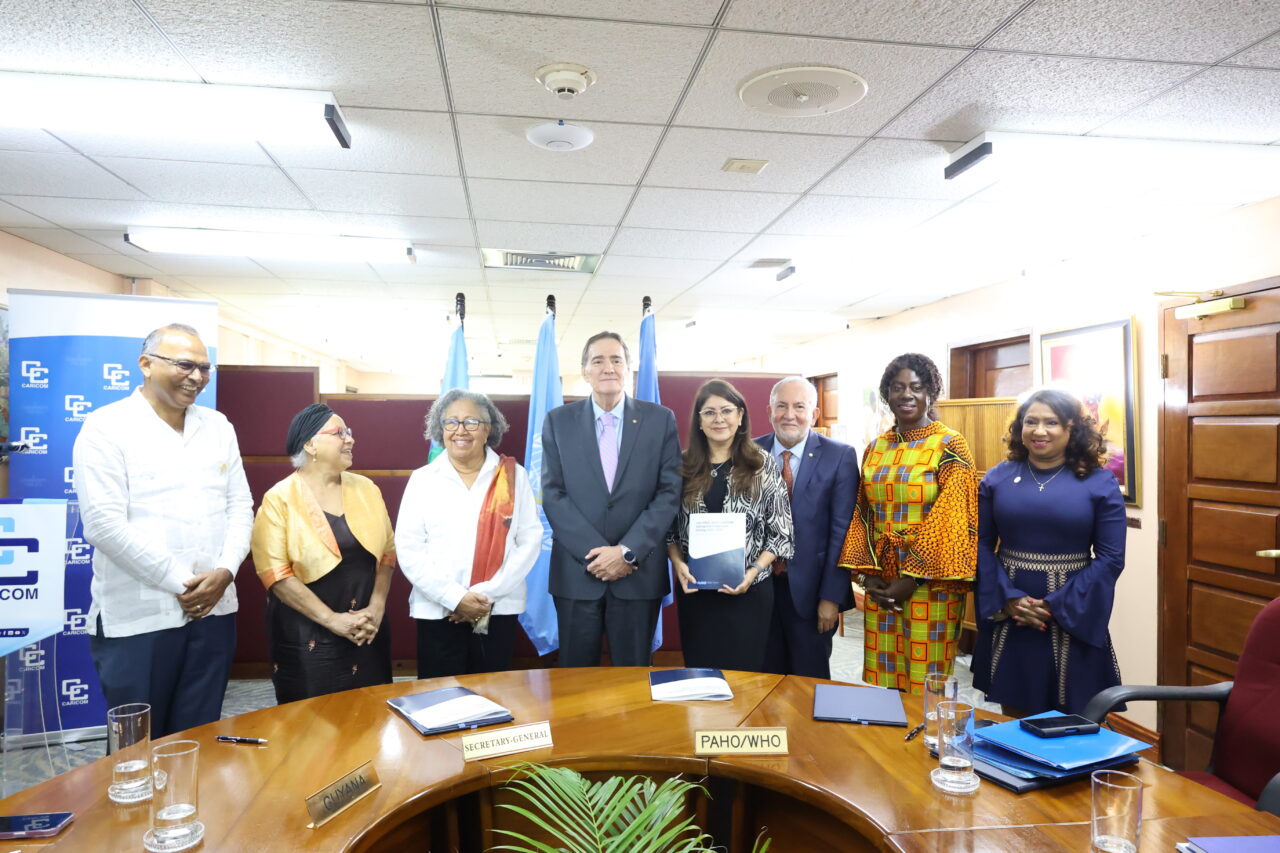
CARICOM remains steadfast in its commitment to advancing maternal and child health as a critical component of the Region’s health and development agenda, working with our Ministries of Health, the Regional Nursing Body, and bilateral and multilateral development partners.
CARICOM Secretary-General Dr Carla BarnettThe theme for World Health Day 2025, “Healthy Beginnings, Hopeful Futures” spotlights maternal and newborn health, and the longer-term well-being of women.
The Region has made good progress in reducing newborn and child mortality. In 2022, the neonatal and under-five mortality rates were in line with the Sustainable Development Goal (SDG) target, at 12 deaths per 1,000 live births, and 18 deaths per 1,000 live births. Further, several Member States and Associate Members of CARICOM have been certified as having eliminated mother-to-child transmission of HIV and Syphilis (EMTCT). We must work to maintain these gains. The work of the Pan Caribbean Partnership Against HIV and AIDS (PANCAP) has been critical to this progress.
Today, as I extend appreciation to our healthcare workers for the formidable role they play in safeguarding lives and, by extension, the future of our Region, I note that there is much more work to be done. I urge all stakeholders to intensify efforts to provide universal access to quality maternal healthcare. Addressing the many risk factors that women face during pregnancy, including socioeconomic status, education, ethnicity, and geographical location, is critical.
The target of reducing maternal mortality to below 70 per 100,000 live births is within reach. Diligent, collective action will ensure that all women in our Community will have equitable access to safer and evidence-based reproductive health practices. Continued investment to strengthen our healthcare infrastructure and systems, including antenatal and postnatal care, community health initiatives, and a workforce that supports reproductive, maternal, neonatal, and child health services are key considerations. So too, is empowering women, through health and reproductive rights education, to lay the groundwork for healthier futures for their children and families.
The Caribbean Community stands at a critical juncture in our collective journey towards improving health outcomes for mothers and newborns. The COVID-19 pandemic adversely impacted our health systems and disrupted our hard-won progress, and climate-related challenges continue, but the lessons learned serve as a call to action to safeguard the future of our families and communities.
CARICOM remains steadfast in its commitment to advancing maternal and child health as a critical component of the Region’s health and development agenda, working with our Ministries of Health, the Regional Nursing Body, and bilateral and multilateral development partners.
In March this year, the CARICOM Secretariat supported the launch of a new initiative from the Pan American Health Organization (PAHO) to strengthen strategies to eliminate key diseases affecting maternal and child health. The Secretariat will continue to support regional initiatives which prioritise maternal and child health, and the survival of newborns.
The commitment to achieve the SDGs, specifically Goal 3, which strives to end preventable deaths of mothers and children, must be unwavering. Let us draw inspiration from our resilient communities and dedicated healthcare workers, and continue to create the path to a future where every mother and child thrives.
]]>